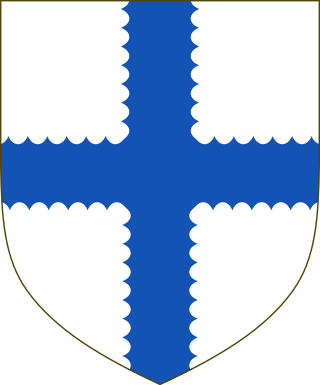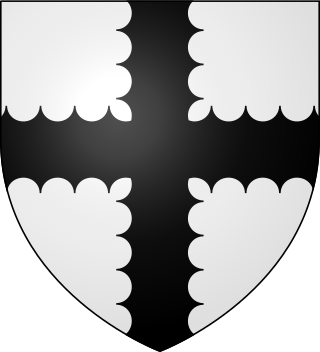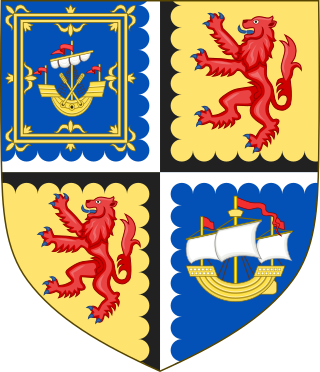Related Research Articles
William Sinclair (1410–1480), 1st Earl of Caithness (1455–1476), last Earl (Jarl) of Orkney, 2nd Lord Sinclair and 11th Baron of Roslin was a Norwegian and Scottish nobleman and the builder of Rosslyn Chapel, in Midlothian.

Lord Sinclair is a title in the Peerage of Scotland. According to James Balfour Paul's The Scots Peerage, volume VII published in 1910, the first person to be styled Lord Sinclair was William Sinclair, 3rd Earl of Orkney and 1st Earl of Caithness. However, according to Roland Saint-Clair writing in the late 19th century, William Sinclair's father, Henry II Sinclair, Earl of Orkney, who died in 1420, is the first person recorded as Lord Sinclair by public records.

Clan Sinclair is a Highland Scottish clan which holds the lands of Caithness, the Orkney Islands, and the Lothians. The chiefs of the clan were the Barons of Roslin and later the Earls of Orkney and Earls of Caithness.
Henry II Sinclair, Earl of Orkney was the Jarl (Earl) of Orkney, Baron of Roslin and Pantler of Scotland. According to Roland Saint-Clair writing in the late 19th century, Henry Sinclair was also the first of his family to hold the title of Lord Sinclair.

Baron of Roslin or Rosslyn was a Scottish feudal barony held by the St Clair or Sinclair family.

John Sinclair was a Scottish nobleman, 3rd Earl of Caithness and chief of the Clan Sinclair, a Scottish clan of the Scottish Highlands.

Sir Henry St Clair was a 13th- and 14th-century Scottish noble, who was the 7th Baron of Roslin and Lord of Catcune.
John Sinclair, Master of Caithness was a Scottish nobleman.

John Sinclair was a Scottish nobleman, 8th Earl of Caithness and chief of the Clan Sinclair, a Scottish clan of the Scottish Highlands.

William St. Clair, 6th Baron of Roslin was a Scottish nobleman of the late 13th century.

William Sinclair of Newburgh, Aberdeenshire was a Scottish nobleman and the 3rd Lord Sinclair. In The Scots Peerage by James Balfour Paul he is designated as the 2nd Lord Sinclair, but historian Roland Saint-Clair designates him the 3rd Lord Sinclair in reference to his descent from his grandfather, Henry II Sinclair, Earl of Orkney, the first Lord Sinclair. Roland Saint-Clair references this to an Act of the Scottish Parliament in which William Sinclair's son, Henry Sinclair, 4th Lord Sinclair, was made Lord Sinclair based on his descent from his great-grandfather, Henry II Sinclair, Earl of Orkney, the first Lord Sinclair. Bernard Burke, in his a Genealogical and Heraldic Dictionary of the Peerage and Baronetage of the British Empire, agrees with Roland Saint-Clair and says that Henry Sinclair was "in reality" the fourth holder of the title of Lord Sinclair.

William St Clair was a Scottish noble and by tradition the 8th Baron of Roslin.

Henry Sinclair was a Scottish noble and the 4th Lord Sinclair. In The Scots Peerage by James Balfour Paul he is designated as the 3rd Lord Sinclair, but historian Roland Saint-Clair designates him the 4th Lord Sinclair and references this to an Act of the Scottish Parliament in which he was made Lord Sinclair based on his descent from his great-grandfather, Henry II Sinclair, Earl of Orkney, the first Lord Sinclair. Bernard Burke, in his a Genealogical and Heraldic Dictionary of the Peerage and Baronetage of the British Empire, agrees with Roland Saint-Clair and says that Henry Sinclair was "in reality" the fourth holder of the title of Lord Sinclair.

William Sinclair was a Scottish nobleman and the 5th Lord Sinclair. In The Scots Peerage by James Balfour Paul he is designated as the 4th Lord Sinclair in descent starting from William Sinclair, 1st Earl of Caithness and 3rd Earl of Orkney, but historian Roland Saint-Clair designates him as the 5th Lord Sinclair in descent from the father of the 1st Earl of Caithness and 3rd Earl of Orkney, Henry II Sinclair, Earl of Orkney, who is the first person recorded as Lord Sinclair in public records. Roland Saint-Clair references this to an Act of the Scottish Parliament in which the 4th Lord Sinclair was made Lord Sinclair based on his descent from his great-grandfather, Henry II Sinclair, Earl of Orkney, the first Lord Sinclair. Bernard Burke, in his a Genealogical and Heraldic Dictionary of the Peerage and Baronetage of the British Empire, agrees with Roland Saint-Clair and says that William Sinclair was "in reality" the fifth Lord Sinclair.

Henry Sinclair was a Scottish nobleman and the 6th Lord Sinclair. In The Scots Peerage by James Balfour Paul he is designated as the 5th Lord Sinclair in descent starting from William Sinclair, 1st Earl of Caithness and 3rd Earl of Orkney, but historian Roland Saint-Clair designates him as the 6th Lord Sinclair in descent from the father of the 1st Earl of Caithness and 3rd Earl of Orkney, Henry II Sinclair, Earl of Orkney, who is the first person recorded as Lord Sinclair in public records. Roland Saint-Clair references this to an Act of the Scottish Parliament in which the 4th Lord Sinclair was made Lord Sinclair based on his descent from his great-grandfather, Henry II Sinclair, Earl of Orkney, the first Lord Sinclair. Bernard Burke, in his a Genealogical and Heraldic Dictionary of the Peerage and Baronetage of the British Empire, agrees with Roland Saint-Clair and says that Henry Sinclair's father, William Sinclair, was "in reality" the fifth Lord Sinclair.

Henry Sinclair was a Scottish nobleman and 7th Lord Sinclair. In The Scots Peerage by James Balfour Paul he is designated as the 6th Lord Sinclair in descent starting from William Sinclair, 1st Earl of Caithness and 3rd Earl of Orkney, but historian Roland Saint-Clair designates him as the 7th Lord Sinclair in descent from the father of the 1st Earl of Caithness and 3rd Earl of Orkney, Henry II Sinclair, Earl of Orkney, who is the first person recorded as Lord Sinclair in public records. Roland Saint-Clair references this to an Act of the Scottish Parliament in which the 4th Lord Sinclair was made Lord Sinclair based on his descent from his great-grandfather, Henry II Sinclair, Earl of Orkney, the first Lord Sinclair. Bernard Burke, in his a Genealogical and Heraldic Dictionary of the Peerage and Baronetage of the British Empire, agrees with the numbering by Roland Saint-Clair and says that Henry Sinclair and William Sinclair were "in reality" the fourth and fifth Lords Sinclair respectively.

James Sinclair was a Scottish nobleman and the 8th Lord Sinclair. In The Scots Peerage by James Balfour Paul he is designated as the 7th Lord Sinclair in descent starting from William Sinclair, 1st Earl of Caithness and 3rd Earl of Orkney, but historian Roland Saint-Clair designates him as the 8th Lord Sinclair in descent from the father of the 1st Earl of Caithness and 3rd Earl of Orkney, Henry II Sinclair, Earl of Orkney, who is the first person recorded as Lord Sinclair in public records. Roland Saint-Clair references this to an Act of the Scottish Parliament in which the 4th Lord Sinclair was made Lord Sinclair based on his descent from his great-grandfather, Henry II Sinclair, Earl of Orkney, the first Lord Sinclair. Bernard Burke, in his a Genealogical and Heraldic Dictionary of the Peerage and Baronetage of the British Empire, agrees with the numbering by Roland Saint-Clair and says that Henry Sinclair and William Sinclair were "in reality" the fourth and fifth Lords Sinclair respectively.

Patrick Sinclair was a Scottish nobleman and the 9th Lord Sinclair. In The Scots Peerage by James Balfour Paul he is designated as the 8th Lord Sinclair in descent starting from William Sinclair, 1st Earl of Caithness and 3rd Earl of Orkney, but historian Roland Saint-Clair designates him as the 9th Lord Sinclair in descent from the father of the 1st Earl of Caithness and 3rd Earl of Orkney, Henry II Sinclair, Earl of Orkney, who is the first person recorded as Lord Sinclair in public records. Roland Saint-Clair references this to an Act of the Scottish Parliament in which the 4th Lord Sinclair was made Lord Sinclair based on his descent from his great-grandfather, Henry II Sinclair, Earl of Orkney, the first Lord Sinclair. Bernard Burke, in his a Genealogical and Heraldic Dictionary of the Peerage and Baronetage of the British Empire, agrees with the numbering by Roland Saint-Clair and says that Henry Sinclair and William Sinclair were "in reality" the fourth and fifth Lords Sinclair respectively.

John Sinclair was a Scottish nobleman and the 10th Lord Sinclair. In The Scots Peerage by James Balfour Paul he is designated as the 9th Lord Sinclair in descent starting from William Sinclair, 1st Earl of Caithness and 3rd Earl of Orkney, but historian Roland Saint-Clair designates him as the 10th Lord Sinclair in descent from the father of the 1st Earl of Caithness and 3rd Earl of Orkney, Henry II Sinclair, Earl of Orkney, who is the first person recorded as Lord Sinclair in public records. Roland Saint-Clair references this to an Act of the Scottish Parliament in which the 4th Lord Sinclair was made Lord Sinclair based on his descent from his great-grandfather, Henry II Sinclair, Earl of Orkney, the first Lord Sinclair. Bernard Burke, in his a Genealogical and Heraldic Dictionary of the Peerage and Baronetage of the British Empire, agrees with the numbering by Roland Saint-Clair and says that Henry Sinclair and William Sinclair were "in reality" the fourth and fifth Lords Sinclair respectively.

Lord Herdmanston was a title in the Peerage of Scotland that was held by the Sinclair or St Clair family.
References
- ↑ Burke, Bernard (1869). Genealogical and Heraldic Dictionary of the Peerage and Baronetage of the British Empire. 59 Pall Mall, London: Harrison. p. 1017 . Retrieved 18 July 2021.
{{cite book}}: CS1 maint: location (link) - ↑ Maclean-Sinclair, Rev. A (1901). The Sinclairs of Roslin, Caithness and Goshen. Charlottetown, Prince Edward Island: The Examiner Publishing Company. Archived from the original on 24 June 2014.
- ↑ Saint-Clair, Roland (1898). The Saint-Clairs of the Isles; being a history of the Sea-kings of Orkney and their Scottish successors of the sirname of Sinclair. Shortland Street, Auckland, New Zealand: H. Brett. p. 311-316. Retrieved 18 July 2021.
- ↑ Allan, Archibald (1900). History of Channelkirk. 54 and 55 South Bridge, Edinburgh: James Thin. pp. 72-73. Retrieved 18 July 2021.
{{cite book}}: CS1 maint: location (link) - 1 2 Paul, James Balfour (1910). The Scots Peerage; Founded on Wood's Edition of Sir Robert Douglas's Peerage of Scotland; Containing an Historical and Genealogical Account of the Nobility of that Kingdom. Vol. VII. Edinburgh: David Douglas. pp. 577-592. Retrieved 18 July 2021.